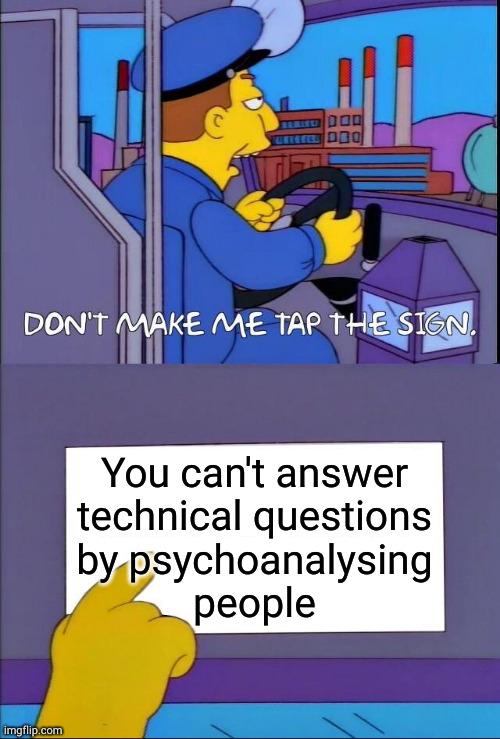All of robertskmiles's Comments + Replies
My perspective, I think, is that most of the difficulties that people think of as being the extra, hard part of to one->many alignment, are already present in one->one alignment. A single human is already a barely coherent mess of conflicting wants and goals interacting chaotically, and the strong form of "being aligned to one human" requires a solution that can resolve values conflicts between incompatible 'parts' of that human and find outcomes that are satisfactory to all interests. Expanding this to more than one person is a change of degree but ...
To avoid lowering the quality of discussion by just posting snarky memes, I'll explain my actual position:
"People may have bad reasons to believe X" is a good counter against the argument "People believe X, therefore X". So for anyone whose thought process is "These EAs are very worried about AI so I am too", I agree that there's a worthwhile discussion to be had about why those EAs believe what they do, what their thought process is, and the track record both of similar claims and of claims made by people using similar thought processes. This is bec...
To avoid lowering the quality of discussion by just posting snarky memes, I'll explain my actual position:
"People may have bad reasons to believe X" is a good counter against the argument "People believe X, therefore X". So for anyone whose thought process is "These EAs are very worried about AI so I am too", I agree that there's a worthwhile discussion to be had about why those EAs believe what they do, what their thought process is, and the track record both of similar claims and of claims made by people using similar thought processes. This is bec...
This sounds like a really useful thing to make!
Do you think there would be value in using the latest language models to do semantic search over this set of (F)AQs, so people can easily see if a question similar to theirs has already been answered? I ask because I'm thinking of doing this for AI Safety questions, in which case it probably wouldn't be far out of my way to do it for librarian questions as well.
I see several comments here expressing an idea like "Perhaps engaging writing is better, but is it worth the extra effort?", and I just don't think that that trade-off is actually real for most people. I think a more conversational and engaging style is quicker and easier to write than the slightly more formal and serious tone which is now the norm. Really good, polished, highly engaging writing may be more work, but on the margin I think there's a direction we can move that is downhill from here on both effort and boringness.
The S-Process is fascinating to me! Do you know of any proper write-ups of how it works? I'm especially interested in code or pseudocode, as I might want to try applying something similar to one of my projects
Exciting! But where's the podcast's URL? All I can find is a Spotify link.
Edit: I was able to track it down, here it is https://spkt.io/f/8692/7888/read_8617d3aee53f3ab844a309d37895c143
A minor point, but I think this overestimates the extent to which a small number of people with an EA mindset can help in crowded cause areas that lack such people. Like, I don't think PETA's problem is that there's nobody there talking about impact and effectiveness. Or rather, that is their problem, but adding a few people to do that wouldn't help much, because they wouldn't be listened to. The existing internal political structures and discourse norms of these spaces aren't going to let these ideas gain traction, so while EAs in these areas might be abl...


I have a couple of videos that talk about this! This one sets up the general idea:
This one talks about how like this is to happen in practice: